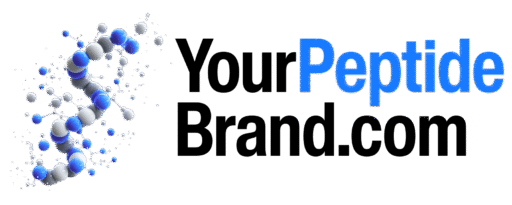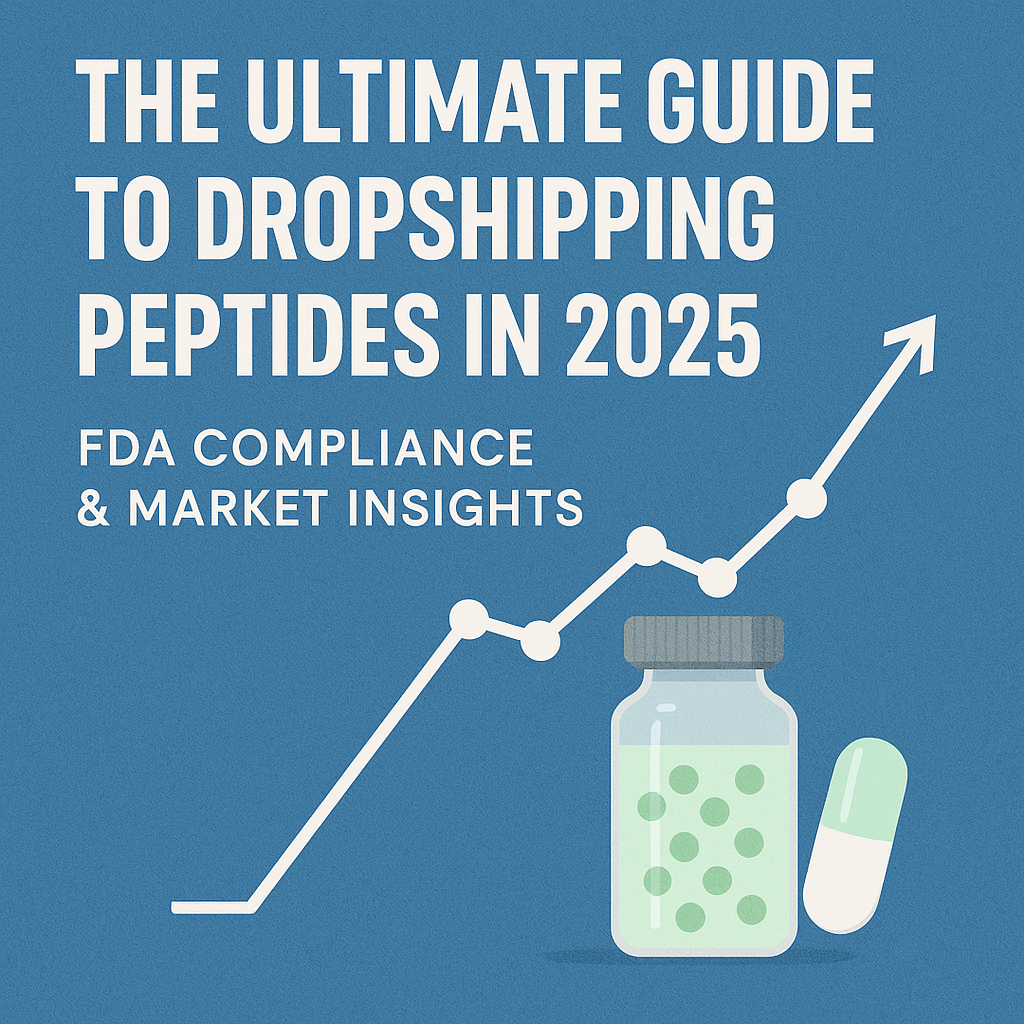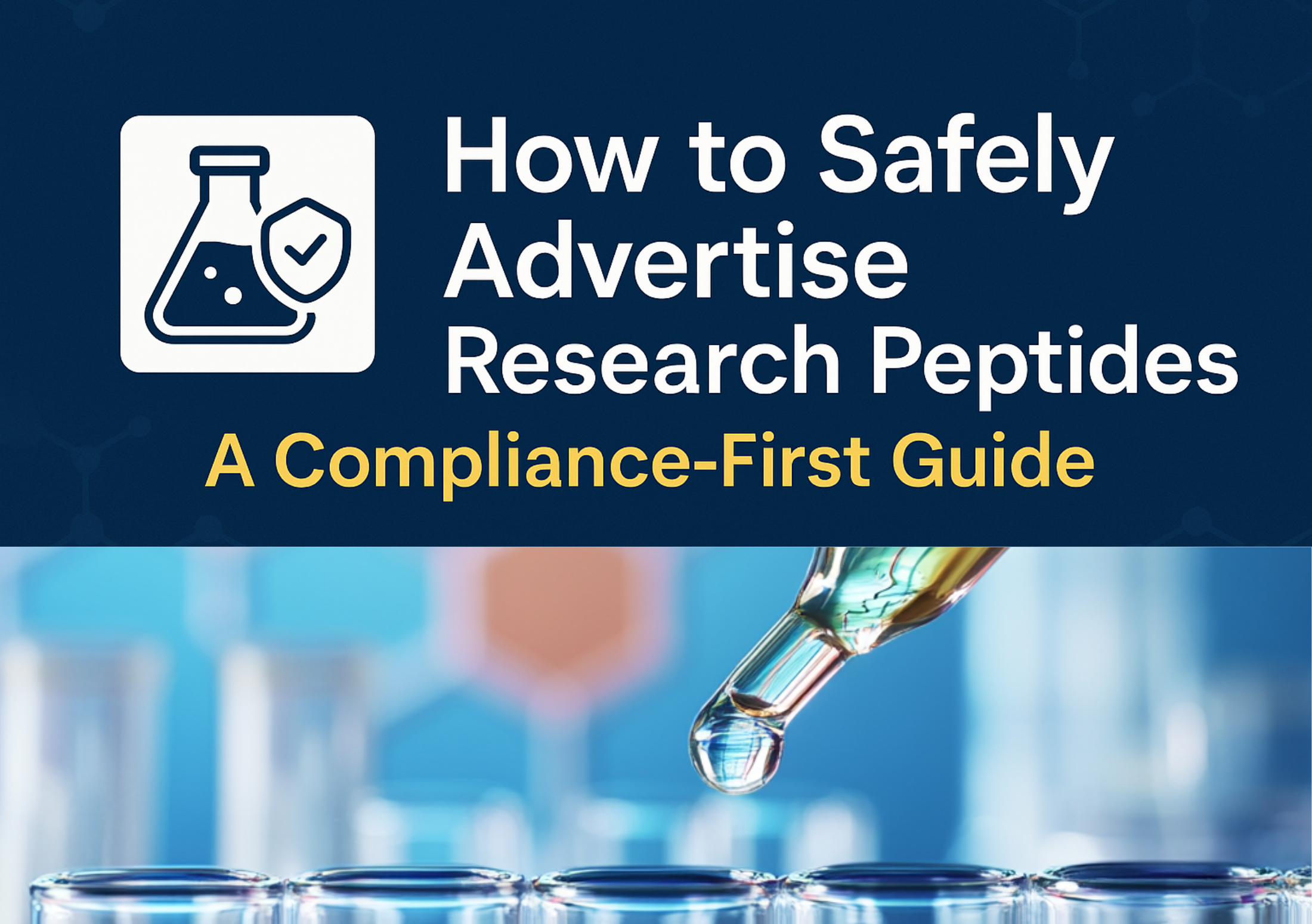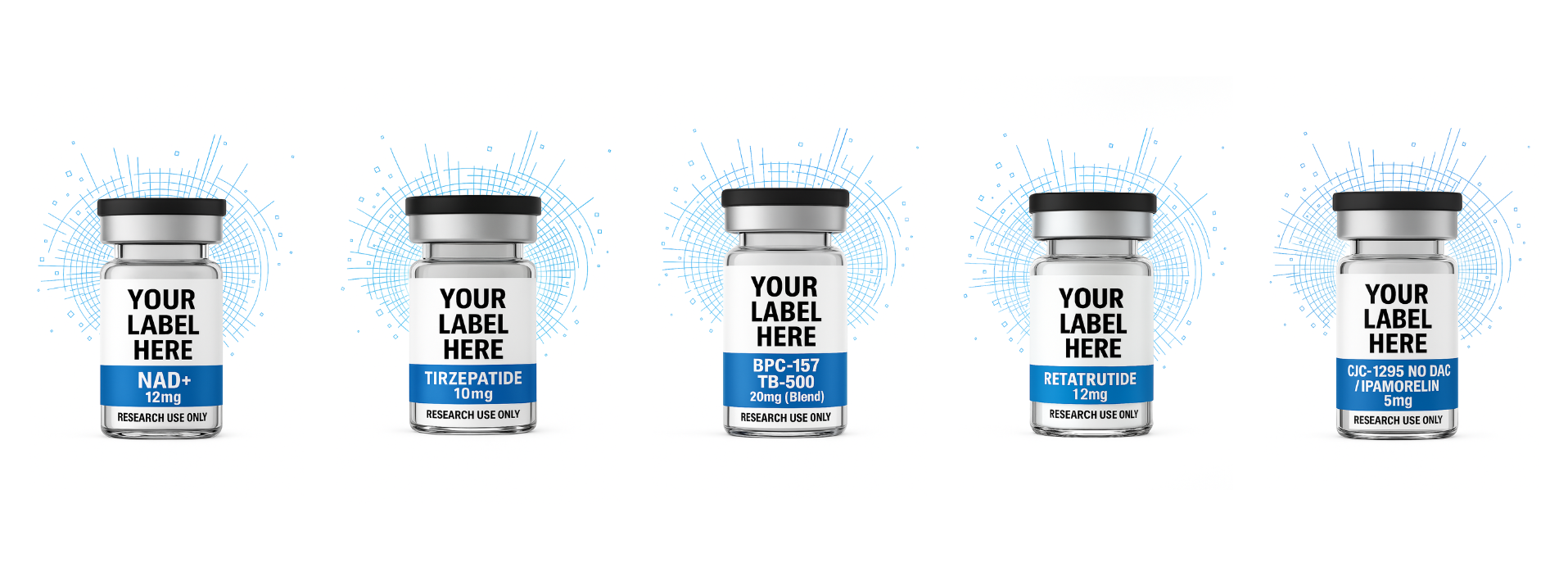The peptide industry has experienced unprecedented growth over the past few years, with the global peptide therapeutics market projected to reach $96.5 billion by 2030, according to Grand View Research. This explosive growth has created unique opportunities for entrepreneurs looking to enter the lucrative world of dropshipping peptides, where businesses can sell these specialized compounds without maintaining physical inventory.
However, dropshipping peptides isn’t your typical e-commerce venture. This highly regulated industry requires deep understanding of compliance requirements, supplier relationships, and customer education to succeed. Whether you’re considering entering this market or looking to optimize your existing peptide dropshipping operation, this comprehensive guide will equip you with the knowledge and strategies needed to build a profitable, compliant business.
In this detailed exploration, we’ll cover everything from FDA regulations and supplier vetting processes to advanced marketing strategies and financial projections. You’ll learn how successful entrepreneurs are navigating the complex regulatory landscape while building seven-figure peptide businesses, and discover the tools and technologies that can give you a competitive edge in this specialized market.
Understanding the Peptide Market: Opportunities and Challenges for Dropshippers
The peptide market presents a fascinating landscape for entrepreneurs willing to navigate its complexities. Research peptides, synthetic peptides used for scientific research purposes, represent a significant portion of the market that’s accessible to dropshipping businesses. Unlike therapeutic peptides which require extensive FDA approval, research peptides operate under different regulatory frameworks that create opportunities for compliant businesses.
Market Size and Growth Projections
The numbers tell a compelling story about the potential in dropshipping peptides. The research peptide market alone is estimated to be worth over $2.8 billion annually, with compound annual growth rates exceeding 8.5%. This growth is driven by increased research activity in biotechnology, pharmaceutical development, and academic institutions worldwide.
Key market drivers include:
- Biotechnology Research Expansion: Universities and private research facilities are increasing their peptide research budgets
- Pharmaceutical Development: New drug discovery processes rely heavily on peptide research
- Academic Growth: More institutions are incorporating peptide research into their programs
- International Markets: Global demand continues to expand, particularly in Asia and Europe
Target Customer Segments
Understanding your potential customers is crucial for successful peptide dropshipping. The primary customer segments include:
Research Institutions
- Universities and colleges with biochemistry programs
- Private research facilities
- Government research laboratories
- Pharmaceutical companies conducting R&D
Individual Researchers
- Graduate students and postdoctoral researchers
- Independent scientists and consultants
- Biotech entrepreneurs and startups
- Academic professionals
Commercial Laboratories
- Contract research organizations (CROs)
- Analytical testing laboratories
- Quality control facilities
- Biotechnology service providers
Competitive Landscape Analysis
The peptide dropshipping market features several distinct competitor categories:
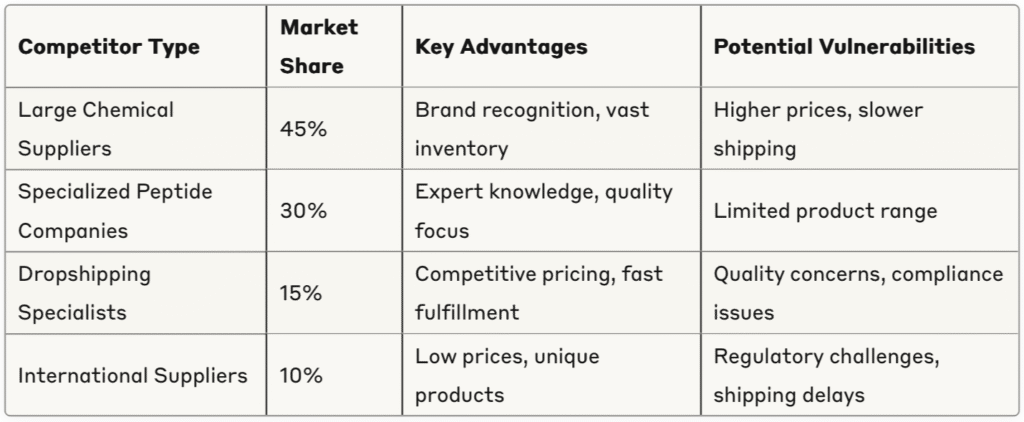
This analysis reveals significant opportunities for well-positioned dropshippers who can combine competitive pricing with reliable quality and compliance standards.
FDA and FTC Compliance: Navigating the Regulatory Landscape
Regulatory compliance represents the most critical aspect of dropshipping peptides successfully. The FDA and FTC have specific requirements that peptide businesses must follow to avoid legal complications and maintain customer trust.
FDA Requirements for Research Peptides
The FDA classifies research peptides as laboratory chemicals rather than dietary supplements or drugs, which creates specific compliance obligations:
Labeling Requirements Research peptides must be clearly labeled with specific disclaimers and information:
- “For Research Use Only” designation
- “Not for Human Consumption” warning
- Chemical composition and purity information
- Storage and handling instructions
- Batch/lot identification numbers
Documentation Standards Proper documentation is essential for FDA compliance:
- Certificate of Analysis (COA) for each batch
- Storage condition records
- Chain of custody documentation
- Quality control test results
- Supplier qualification records
FTC Advertising and Marketing Compliance
The Federal Trade Commission enforces strict rules about peptide marketing claims:
Prohibited Claims Businesses engaged in dropshipping peptides must avoid:
- Any health or medical benefit claims
- References to human therapeutic use
- Weight loss or performance enhancement promises
- Age-related or cosmetic improvement suggestions
- Any language implying FDA approval for human use
Required Disclosures All marketing materials must include:
- Clear research-only disclaimers
- Accurate product descriptions
- Honest pricing and shipping information
- Privacy policy and terms of service links
- Contact information and business address
State and Local Regulations
Beyond federal requirements, peptide dropshippers must consider state and local regulations:
Business Licensing
- State business registration requirements
- Local business permits and licenses
- Sales tax registration where applicable
- Professional licensing if required
Import/Export Considerations
- Customs documentation for international shipments
- Import permits for certain peptides
- Export control compliance
- International shipping restrictions
Supplier Vetting and Relationship Management
Success in dropshipping peptides depends heavily on establishing relationships with reliable, compliant suppliers. The vetting process requires careful attention to quality, compliance, and reliability factors.
Essential Supplier Qualification Criteria
Manufacturing Standards Quality suppliers should demonstrate:
- ISO certification or equivalent quality management systems
- Good Manufacturing Practice (GMP) compliance
- Regular third-party audits and inspections
- Documented quality control procedures
- Proper equipment calibration and maintenance records
Testing and Documentation Capabilities Reliable suppliers must provide:
- High-Performance Liquid Chromatography (HPLC) analysis
- Mass spectrometry confirmation
- Purity testing results (typically >95% minimum)
- Endotoxin testing for applicable products
- Complete Certificates of Analysis for each batch
Supplier Evaluation Framework
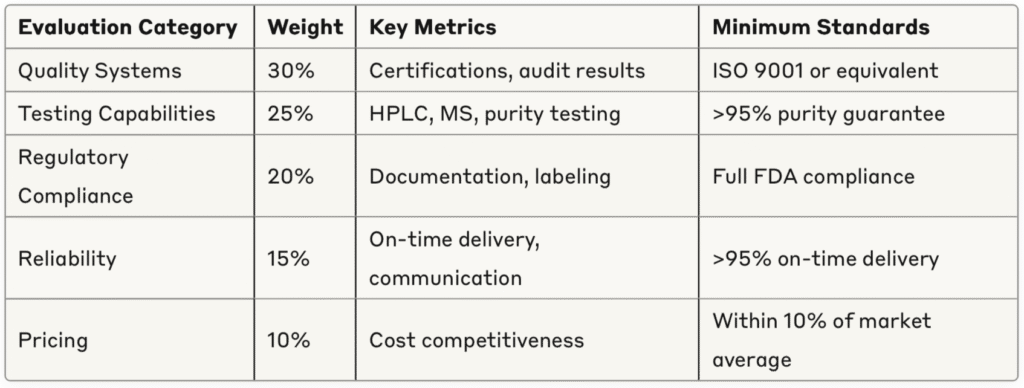
Building Strong Supplier Relationships
Successful peptide dropshippers invest in long-term supplier relationships through:
Regular Communication
- Weekly status calls with key suppliers
- Quarterly business reviews
- Annual supplier summits or visits
- Immediate notification systems for issues
Performance Monitoring
- Monthly scorecards tracking key metrics
- Customer feedback integration
- Quality incident tracking and resolution
- Continuous improvement initiatives
Strategic Partnerships
- Exclusive product arrangements
- Custom peptide synthesis capabilities
- Priority allocation during supply constraints
- Joint marketing and education initiatives
Operational Excellence: Building Efficient Systems
Efficient operations are the backbone of successful dropshipping peptides businesses. Unlike traditional dropshipping, peptide operations require specialized handling, storage, and shipping procedures.
Inventory Management Without Physical Inventory
Even though dropshippers don’t maintain physical inventory, they need sophisticated systems to track supplier availability:
Real-Time Inventory Tracking
- Automated supplier inventory feeds
- Stock level alerts and notifications
- Backorder management systems
- Supplier lead time tracking
Demand Forecasting
- Historical sales pattern analysis
- Seasonal demand variations
- Research calendar considerations
- Economic indicator correlations
Order Processing and Fulfillment
Automated Order Routing Successful peptide dropshippers use automated systems to:
- Route orders to optimal suppliers
- Validate customer eligibility
- Check compliance requirements
- Generate required documentation
Quality Control Checkpoints
- Pre-shipment verification protocols
- Supplier performance monitoring
- Customer feedback integration
- Continuous improvement processes
Customer Service Excellence
Peptide customers require specialized support due to the technical nature of the products:
Technical Support Capabilities
- Staff trained in peptide chemistry and applications
- Research protocol assistance
- Storage and handling guidance
- Troubleshooting and problem resolution
Communication Standards
- Response time commitments (<2 hours for technical questions)
- Proactive order status updates
- Educational content delivery
- Personalized account management for high-value customers
Technology Stack and E-commerce Platform Selection
The right technology foundation is crucial for dropshipping peptides efficiently and compliantly. Specialized requirements demand carefully chosen platforms and tools.
E-commerce Platform Requirements
Essential Features for Peptide Dropshipping
- Compliance documentation management
- Restricted access controls for research customers
- Complex product attribute handling
- Integration with laboratory information management systems (LIMS)
- Advanced inventory management for dropshipped products
Integration Requirements
Supplier System Integration
- Electronic Data Interchange (EDI) connections
- Real-time inventory feeds
- Automated purchase order generation
- Shipment tracking integration
Compliance Management Tools
- Document management systems
- Audit trail capabilities
- Regulatory reporting tools
- Customer verification systems
Security and Data Protection
Peptide businesses handle sensitive research information requiring robust security measures:
Data Security Standards
- SOC 2 Type II compliance
- Payment Card Industry (PCI) DSS compliance
- Regular security audits and penetration testing
- Encrypted data transmission and storage
Customer Privacy Protection
- GDPR compliance for international customers
- Research confidentiality agreements
- Data retention policies
- Secure customer portal access
Quality Assurance and Testing Protocols
Quality assurance represents a critical differentiator in dropshipping peptides. Customers depend on consistent, high-quality products for their research, making quality control non-negotiable.
Quality Control Standards
Industry Standards and Certifications Successful peptide dropshippers adhere to:
- International Conference on Harmonisation (ICH) guidelines
- Good Manufacturing Practice (GMP) standards
- ISO 17025 testing laboratory standards
- USP (United States Pharmacopeia) monograph requirements where applicable
Testing Requirements by Product Category
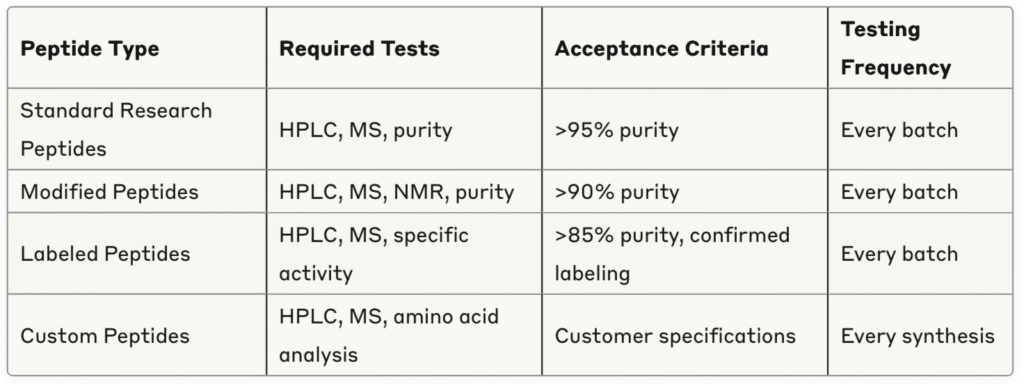
Certificate of Analysis (COA) Management
COA Requirements Every peptide shipment must include comprehensive documentation:
- Batch identification and traceability
- Complete analytical testing results
- Storage condition recommendations
- Expiration date and stability data
- Chain of custody information
Digital COA Systems Modern peptide dropshippers implement:
- Searchable digital COA databases
- Customer portal access to historical COAs
- Mobile-friendly COA viewing
- Integration with customer laboratory systems
Continuous Quality Improvement
Supplier Quality Audits
- Annual on-site supplier audits
- Quarterly quality reviews
- Monthly performance scorecards
- Immediate corrective action protocols
Customer Feedback Integration
- Systematic customer satisfaction surveys
- Product performance tracking
- Research outcome correlation analysis
- Continuous improvement implementation
Customer Education and Support Strategies
Success in dropshipping peptides requires educating customers about proper handling, storage, and research applications. Well-informed customers become loyal, repeat buyers who generate higher lifetime value.
Educational Content Development
Technical Resource Library Comprehensive educational resources should include:
- Peptide handling and storage guides
- Research protocol recommendations
- Troubleshooting manuals
- Safety data sheets and handling procedures
- Video tutorials and webinar series
Content Categories and Topics
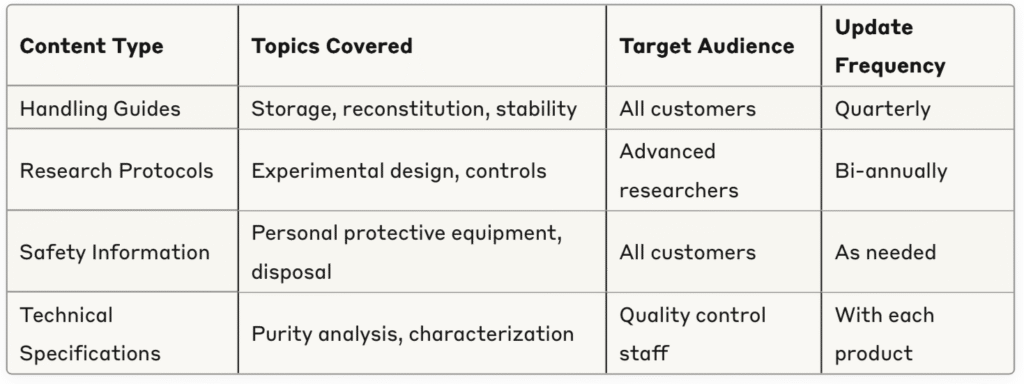
Customer Support Specialization
Technical Support Team Structure
- PhD-level technical advisors for complex inquiries
- Chemistry specialists for synthesis questions
- Regulatory experts for compliance guidance
- Customer success managers for relationship building
Support Channel Optimization
- Live chat with technical specialists during business hours
- Email support with guaranteed response times
- Phone support for urgent technical issues
- Video consultation services for complex problems
Research Community Building
Professional Network Development
- Scientific conference participation and sponsorship
- Research publication support and collaboration
- Industry association memberships
- Academic partnership programs
Customer Loyalty Programs
- Volume-based pricing tiers
- Early access to new peptides
- Exclusive educational content
- Research collaboration opportunities
Marketing and SEO Strategies for Peptide Dropshipping
Marketing dropshipping peptides requires specialized approaches that balance regulatory compliance with effective customer acquisition. Traditional marketing methods often don’t apply due to strict advertising restrictions.
Search Engine Optimization (SEO) Strategy
Keyword Research and Strategy Effective peptide SEO focuses on research-oriented terms:
- Primary keywords: “research peptides,” “peptide synthesis,” “laboratory peptides”
- Long-tail keywords: “high purity research peptides,” “custom peptide synthesis services”
- Technical keywords: specific peptide names, CAS numbers, molecular formulas
- Educational keywords: “peptide handling protocols,” “peptide storage guidelines”
Content Marketing Framework

Compliant Digital Marketing
Email Marketing Strategies
- Educational newsletter series
- Research protocol updates
- New product announcements
- Technical webinar invitations
Social Media Compliance
- LinkedIn for professional B2B networking
- Twitter for scientific community engagement
- YouTube for educational content delivery
- Facebook for industry news and updates
Content Marketing Best Practices
- Focus on educational value over promotional content
- Maintain scientific accuracy in all materials
- Include appropriate disclaimers and compliance statements
- Regularly update content based on regulatory changes
Professional Networking and Partnerships
Industry Conference Marketing
- Exhibit at relevant scientific conferences
- Sponsor research symposiums and workshops
- Present educational sessions on peptide research
- Network with key opinion leaders in the field
Academic Partnerships
- Collaborate with university research programs
- Support graduate student research projects
- Provide educational grants and sponsorships
- Develop joint research initiatives
Financial Planning and Revenue Optimization
Building a profitable dropshipping peptides business requires careful financial planning and revenue optimization strategies. The high-value, low-volume nature of peptide sales creates unique financial dynamics.
Revenue Model Analysis
Pricing Strategy Framework Peptide pricing typically follows a value-based model considering:
- Research complexity and synthesis difficulty
- Purity requirements and testing costs
- Market demand and competition levels
- Customer segment and purchase volume
- Regulatory compliance costs
Margin Analysis by Product Category

Financial Projections and Modeling
Year 1-3 Revenue Projections Realistic peptide dropshipping businesses can expect:
- Year 1: $200,000 – $500,000 (establishment phase)
- Year 2: $500,000 – $1,200,000 (growth phase)
- Year 3: $1,000,000 – $2,500,000 (optimization phase)
Key Performance Indicators (KPIs)
- Customer Lifetime Value (CLV): $15,000 – $50,000
- Customer Acquisition Cost (CAC): $500 – $2,000
- Average Order Value (AOV): $1,500 – $8,000
- Monthly Recurring Revenue (MRR) growth: 15-25%
Cost Management and Optimization
Operating Expense Categories
- Supplier costs: 40-60% of revenue
- Technology and platform costs: 5-10% of revenue
- Marketing and customer acquisition: 10-20% of revenue
- Staff and operational costs: 15-25% of revenue
- Regulatory and compliance costs: 3-7% of revenue
Optimization Strategies
- Volume-based supplier negotiations
- Automated process implementation
- Customer retention program investment
- Strategic technology upgrades
Risk Management and Legal Considerations
Dropshipping peptides involves significant regulatory and business risks that require proactive management strategies. Understanding and mitigating these risks is essential for long-term success.
Regulatory Risk Assessment
Primary Regulatory Risks
- FDA enforcement actions for non-compliance
- FTC penalties for misleading marketing claims
- State and local licensing violations
- International shipping regulation changes
- Product liability and customer safety issues
Risk Mitigation Strategies
- Regular compliance audits and legal reviews
- Comprehensive insurance coverage
- Documented standard operating procedures
- Staff training and certification programs
- Continuous regulatory monitoring systems
Business Risk Management
Operational Risk Categories

Legal Structure and Protection
Business Entity Considerations
- Limited Liability Company (LLC) for operational flexibility
- Corporation for investor funding potential
- Professional liability insurance requirements
- International business structure for global operations
Intellectual Property Protection
- Trademark registration for business branding
- Trade secret protection for proprietary processes
- Non-disclosure agreements with suppliers and staff
- Patent considerations for innovative synthesis methods
Technology Integration and Automation
Advanced technology integration separates successful dropshipping peptides businesses from their competitors. Automation reduces costs, improves accuracy, and enhances customer satisfaction.
Automation Opportunities
Order Processing Automation
- Automated order routing and supplier selection
- Real-time inventory checking and allocation
- Compliance verification and documentation generation
- Customer notification and tracking systems
Customer Relationship Management (CRM)
- Lead scoring and qualification automation
- Personalized communication workflows
- Customer lifecycle management
- Support ticket routing and escalation
Advanced Analytics Implementation
Data Analytics Framework
- Customer behavior analysis and segmentation
- Predictive inventory management
- Supplier performance optimization
- Market trend identification and response
Key Metrics Dashboard
- Real-time sales and revenue tracking
- Supplier performance monitoring
- Customer satisfaction measurement
- Compliance status reporting
Future Technology Considerations
Emerging Technologies
- Artificial Intelligence (AI) for customer service
- Machine Learning for demand forecasting
- Blockchain for supply chain transparency
- Internet of Things (IoT) for environmental monitoring
Implementation Roadmap
- Phase 1: Basic automation and analytics
- Phase 2: Advanced CRM and inventory management
- Phase 3: AI and machine learning integration
- Phase 4: Blockchain and IoT implementation
Building Customer Relationships and Loyalty
Long-term success in dropshipping peptides depends on building strong, trust-based relationships with research customers. High customer lifetime values make retention strategies particularly valuable.
Customer Segmentation Strategy
Segmentation Framework
- Academic researchers: Universities and research institutions
- Commercial labs: Contract research organizations and testing facilities
- Biotechnology companies: Startup and established pharmaceutical companies
- Government agencies: Federal and state research facilities
Customized Service Approaches
- Academic: Educational pricing, flexible payment terms, research support
- Commercial: Volume discounts, priority service, custom synthesis
- Biotech: Partnership opportunities, exclusive products, technical collaboration
- Government: Compliance documentation, security clearances, procurement processes
Customer Retention Programs
Value-Added Services
- Free technical consultation and protocol development
- Priority customer support and dedicated account management
- Early access to new products and research innovations
- Educational webinar series and training programs
Loyalty Program Structure
- Tier-based benefits based on annual purchase volume
- Exclusive access to limited-quantity or custom peptides
- Referral bonuses and partnership opportunities
- Research collaboration and co-publication opportunities
Customer Success Measurement
Success Metrics and KPIs
- Customer retention rate: Target >85% annually
- Net Promoter Score (NPS): Target >50
- Customer satisfaction scores: Target >4.5/5.0
- Average customer lifetime value: Target >$25,000
Continuous Improvement Process
- Regular customer satisfaction surveys
- Focus groups with key customer segments
- Performance metrics review and optimization
- Competitive benchmarking and improvement initiatives
Future Trends and Market Evolution
The dropshipping peptides industry continues evolving rapidly, driven by technological advances, regulatory changes, and expanding research applications. Understanding future trends is crucial for long-term business planning.
Technological Developments
Synthesis Technology Advances
- Automated peptide synthesizers reducing costs and improving quality
- Green chemistry approaches for environmentally sustainable production
- Continuous flow synthesis for improved efficiency
- Artificial intelligence-guided synthesis optimization
Quality Control Innovations
- Real-time quality monitoring during synthesis
- Advanced analytical techniques for purity verification
- Blockchain-based authentication and traceability
- Automated quality control and documentation systems
Market Expansion Opportunities
Geographic Markets
- Asia-Pacific region showing 12%+ annual growth
- European Union regulatory harmonization creating opportunities
- Latin American market development and expansion
- Middle East and Africa emerging market potential
Application Areas
- Personalized medicine research driving peptide demand
- Agricultural biotechnology applications expanding
- Cosmetic and nutraceutical research growth
- Environmental and sustainable technology applications
Regulatory Evolution
Expected Regulatory Changes
- Enhanced international harmonization of peptide regulations
- Stricter quality control and documentation requirements
- Increased focus on environmental and safety considerations
- Digital documentation and blockchain verification standards
Preparation Strategies
- Proactive compliance monitoring and implementation
- Technology investment for regulatory readiness
- Staff training and certification programs
- Industry association participation and advocacy
Conclusion: Your Roadmap to Peptide Dropshipping Success
The opportunity in dropshipping peptides has never been greater, but success requires careful attention to compliance, quality, and customer relationships. This comprehensive guide has provided you with the foundational knowledge and strategic framework needed to build a profitable peptide dropshipping business.
Remember that success in this industry comes from understanding that you’re not just selling products—you’re supporting scientific research that could lead to breakthrough discoveries in medicine, biotechnology, and other critical fields. This mission-driven approach, combined with operational excellence and regulatory compliance, creates the foundation for long-term success.
The key takeaways for your peptide dropshipping journey include:
Regulatory Compliance First: Always prioritize FDA and FTC compliance over short-term profits. Non-compliance can destroy your business overnight, while compliant operations create sustainable competitive advantages.
Quality Without Compromise: Your customers depend on high-quality peptides for their research. Never compromise on quality standards, testing requirements, or supplier vetting processes.
Education and Support: Invest heavily in customer education and technical support. Well-informed customers become loyal advocates who generate referrals and repeat business.
Technology as an Enabler: Implement robust technology systems that automate routine tasks, ensure compliance, and provide exceptional customer experiences.
Long-term Relationship Building: Focus on building lasting relationships with both suppliers and customers. The peptide industry is relationship-driven, and trust takes time to build but creates enormous value.
Continuous Learning and Adaptation: Stay informed about regulatory changes, technological advances, and market trends. The peptide industry evolves rapidly, and successful businesses adapt quickly to changes.
Whether you’re just starting your research into dropshipping peptides or ready to launch your business, remember that success comes from careful planning, meticulous execution, and unwavering commitment to compliance and quality. The peptide market offers tremendous opportunities for entrepreneurs willing to invest the time and resources needed to succeed.
As you move forward with your peptide dropshipping venture, consider partnering with established industry players who can provide the expertise, quality, and compliance support you need. Visit YourPeptideBrand.com to explore partnership opportunities, supplier relationships, and educational resources that can accelerate your path to success.
The future of peptide research depends on reliable, compliant suppliers who understand the critical importance of quality and service. By following the strategies and principles outlined in this guide, you can build a business that not only generates significant profits but also contributes meaningfully to scientific advancement and discovery.
Your journey in dropshipping peptides begins with a single step. Take that step today, armed with the knowledge and confidence needed to succeed in this exciting and rewarding industry.
